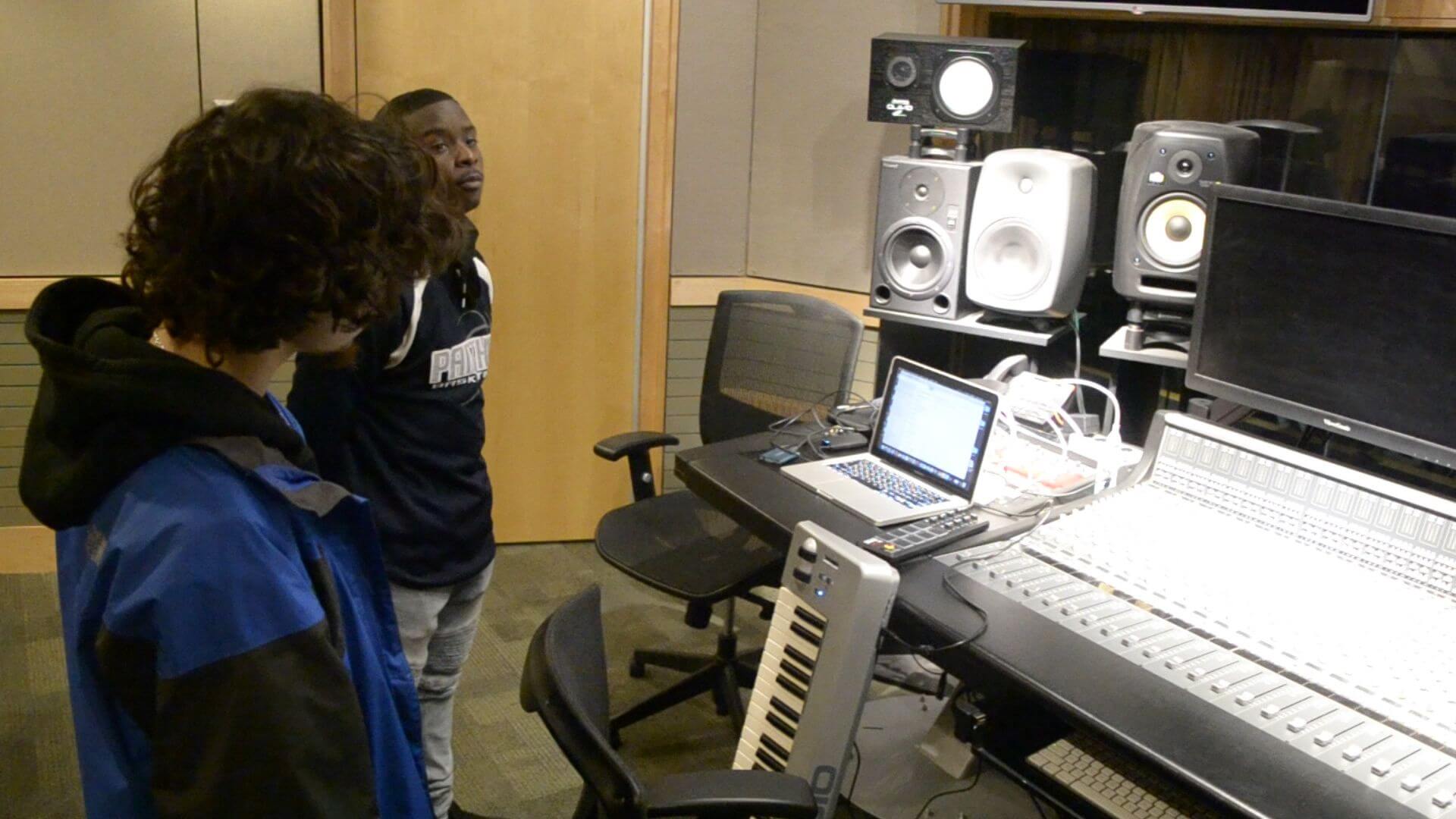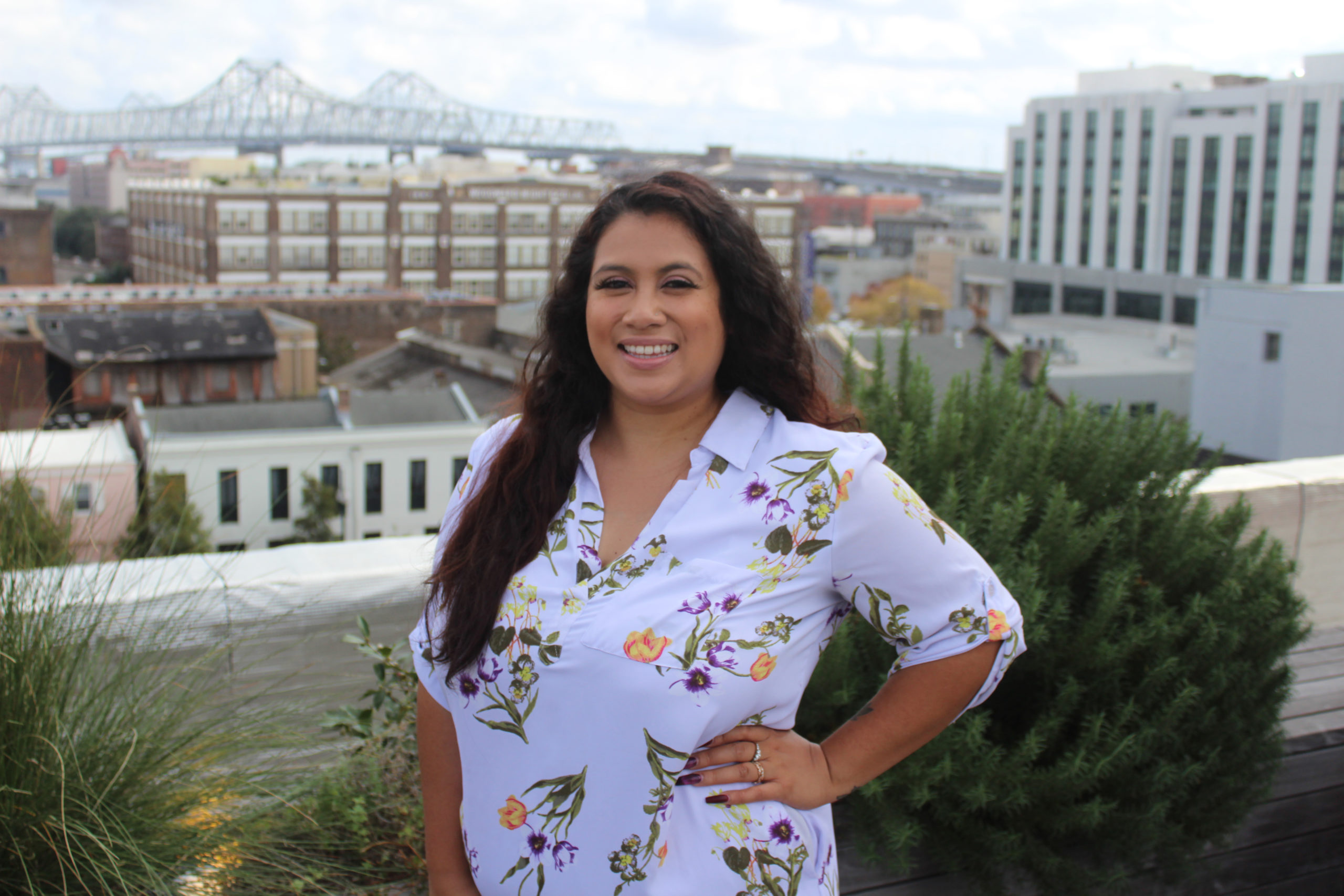It’s no secret that New Orleans brings out the stars, but for them to hang out and make music at one of the Uptown universities? Not so frequent, until now.
Word is that national artists have been visiting the new studios at Loyola University, built as part of its new degree program in urban and electronic music production. The program is the first of its kind in the nation, and people from across the country are taking notice.
Grammy Award winner and Loyola faculty member Lovell “U-P” Cooper talked to us about the program, New Orleans culture and bounce music, and why bringing pop and urban sounds to a university is key to its survival.
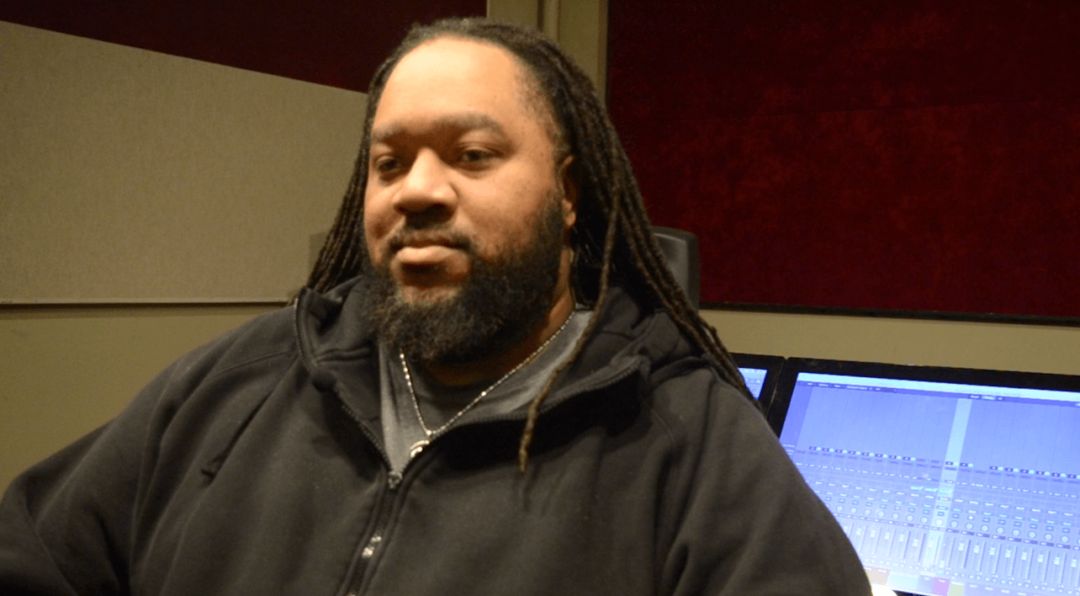
“I did pieces for the Carter V (by Lil Wayne) here. We’ve had A$AP Ferg come through. We did some radio edits for “New Level,” his platinum single. G Easy comes through, he speaks a lot. Mannie Fresh has come through, we’ve done a couple of things with him. Jay Jones from Young Money has recorded here a lot, we can keep going. It’s been quite a few. Wale came about a month ago, Chase N. Cashe, DJ Spin. It’s good because it keeps growing, because the more people find out that I’m here and we can manage their needs, and that’s kind of the thing I want them to understand. You can come here and we got you. We’ll make sure your record is right. Everybody that comes in and sees it, they’re like, ‘Wow, I didn’t know Loyola had this.’”
So, hypothetically if someone came in town and they got the itch to record, they could come here?
“Right. At the same time, I’m always making sure people understand this is still a learning environment. So, you’re just not going to come here and ask for blue M&Ms. It’s not that type of situation. When you come here, for the artists that do want to come, they understand that coming in and it’s crazy because they love it. They love having the students sit in and having the students working with them. It’s funny because some of the students actually get on the record. The artist might ask, ‘Hey do you have an idea for this song?’ And they always say of course. I know one student told Ferg, ‘Man, I got beats for you.’ Ferg was like, ‘Really? Give me some beats! I love listening to beats!’ He gave Ferg an entire flash drive of like 200 beats.”
How does it feel to be a part of this program?
“That’s a hard question to answer because I’ve never been a part of something that hasn’t been done before. So, I don’t really know how it feels. It’s surreal and at the same time you’re burning 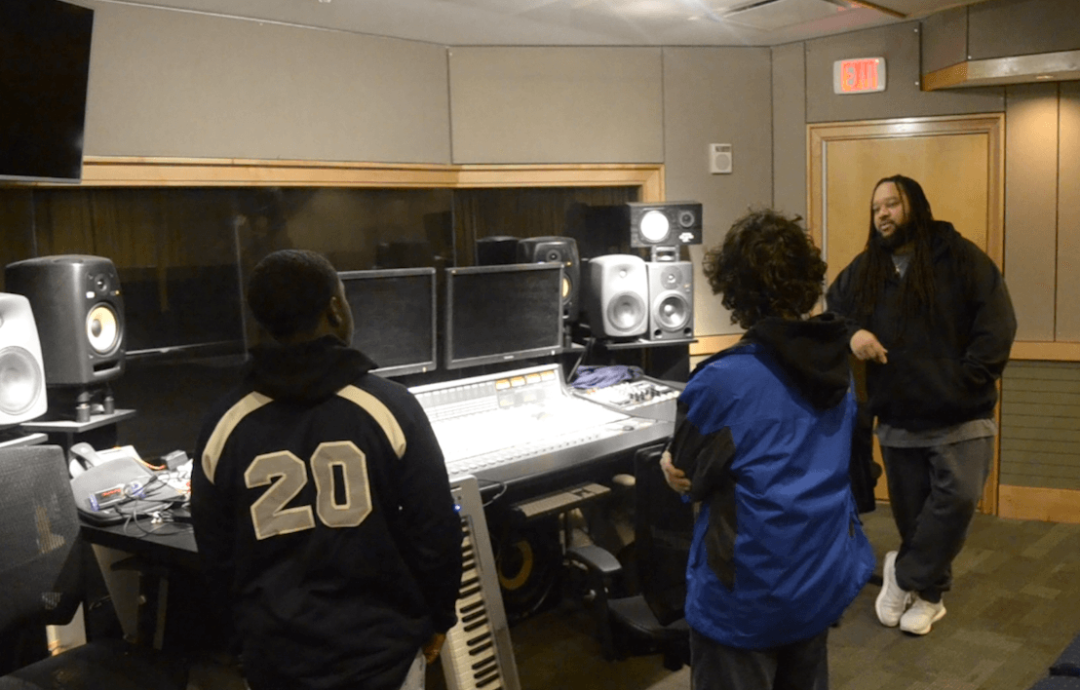
Are you from here? What makes the music culture so unique?
“Yes, I am. We’re going to have History 101 now. The thing about New Orleans is it dates back to slavery, and we were able to keep our musical culture. Then that, combined with the Native Americans, combined with all the French cultures and European culture. So through the years, it’s developed into this gumbo of awesomeness. That’s what gives it that thing, that spice.”
Do you think that’s what allows a music program like this to thrive?
“Yeah, it has to. When you come to New Orleans, you can’t get the spirit of music anywhere else, in my opinion. You can’t just walk out on the street, take a breath, and feel like, ‘Oh, there’s music.’ You can’t go anywhere else, turn down the street and a high school band is marching down the street practicing, then turn down another street and see a jazz band practicing, or street musicians who are more talented than more major, mainstream artists. That’s just New Orleans, that’s the culture, you can’t beat that and you can’t get that anywhere.
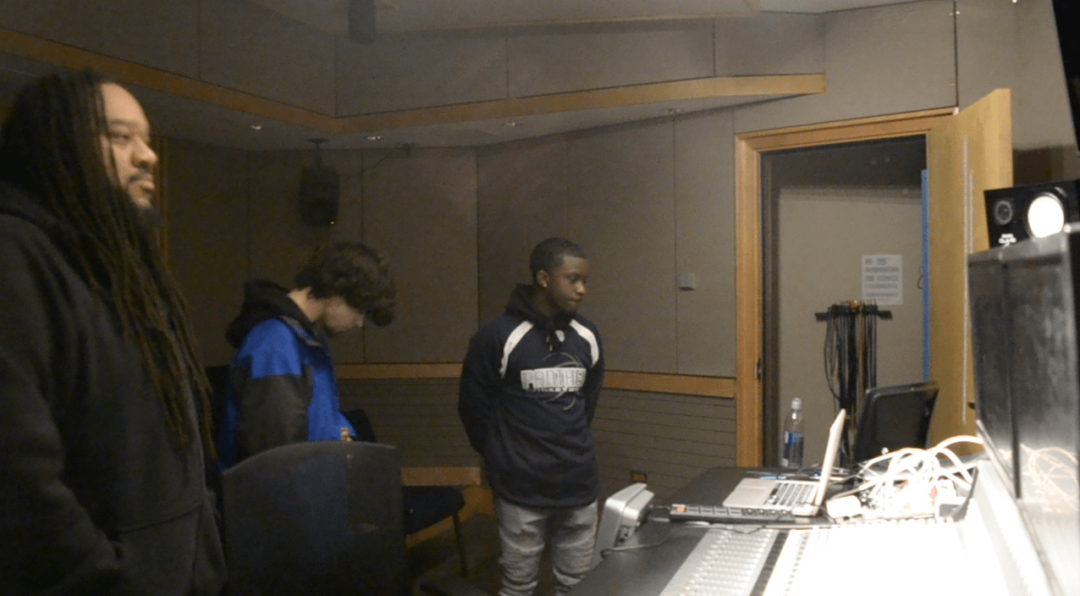
“I think it’s a combination of both. I mean. Yes, it’s trendy because no one else can do it. When you get an artist like Drake doing it like that, it just takes off. If you remember a few years ago, T.I. had a record that was bounce. So, every couple of years there’s s a bounce song or a bounce artist who will blow up because the world is not used to hearing this consecutively. It’s a certain energy, spirituality to it, behind the music. It’s not just beats, it’s a lot more that goes into it.”
When you work with someone that’s not from here, what’s their reaction to bounce?
“I get phone calls, still, from people who are like, ‘I need a bounce record.’ Everybody wants a bounce record now. They don’t really know what they’re asking for, but they want that New Orleans sound. Y’all don’t really want the true New Orleans sound, y’all want the Drake version of it. Which is a variation, because that’s not true, authentic bounce music. That’s kind of a watered down version of it for the mainstream.”
Why did Loyola decide for this subject to become a degree program? I feel like, when we were growing up, everybody said they wanted to be a rapper or producer and it was just a big dream. No one took it seriously.
“I know when I got [to Loyola], I just kept yelling about it. We always will say, ‘Man if I only had this when I was in college.’ Everybody says that, I say that. I went to Grambling, I love the heck out of Grambling, but at the same time we didn’t have studios or anything like that where we could go in, work all night, and just create. We didn’t have professors that were able to speak our language in terms of the music we were making. We didn’t have professionals floating around campus.
So, to have this here, it serves a need that we’ve had since I’ve been around. So my thing was, let’s give people something that I’ve always wanted. I don’t think of it as something groundbreaking or world-renowned, because that’s too big for my brain. I think of it as, this is something that I’ve wanted and the people I’ve worked with, we’re trying to give the average consumer something that we worked so hard to get but we didn’t have a direct path. It’s trying to give people something that we never had and not make the mistakes that we did. I think the biggest reason for us making the mistakes we did is because we were ignorant. We didn’t know. I didn’t understand about contracts and legal.
When I did records for people back in the day, I had a #1 hit on the radio and never got paid for it. I didn’t even know it was my song at one point, because I had done the song like three years earlier. I heard the song on the radio and said, ‘That beat sounds awesome,’ and I was like, ‘Wait, that beat sounds very familiar?’ A friend of mine said ‘You did that, didn’t you?’ That’s how records used to get lost in the ether back then. Now there’s this groundwork, and we’re respected. Even though pop and urban music is a number one selling genre, we’re still fighting for the respect that we deserve. It needed to come to academia and brought the right way. Not just we teach a class here and there, no. Let’s really teach it the right way. Teach the culture, teach how to make a hit record. What does that really mean? I’m so tired of people coming to me saying, ‘Oh, can you mix and master?’ Do you know what that really means?”
So legal and contracts, things like that are a part of the program?
“Yeah, you run it. From day one, you come in, you start your label, you find your artist, you do the legal, the management. You do everything a record label would do. It teaches you, even if you’re an artist, the people you’re working with, and you might be a part of the label. So, you’re earning the other aspects of what you need to know. The other part of this is theory. You have to know some part of theory. You have to know music to some degree in order to communicate properly with the musicians, or a producer. If you go in, and a producer tells you, ‘Write 16 bars,’ and it’s very simple and happens all the time, and you go ‘What’s a bar?’ Really? But you’re a rap artist, or a singer. Or if someone says, ‘Oh, I can’t sing that high.’ Well, what does that mean? Do you need the key changed? Do I go up, do I go down, a half-step or a whole step? Simple little things are the things that will make you a better artist, and you don’t learn that until you come to a program like this.”
So you’re teaching the kids here how to communicate effectively with professionals.
“Yes, that’s the way I like to do it. I’m going to show you the door, but I’ll never open it for you. I’ll even put little arrows down on the ground, and say, ‘There’s your way to the door,’ but I’m not going to hold your hand. I had one guy who was trying to learn to engineer. He came with the attitude like he already knew certain things. So I said, ‘Are you ready to take a test to be my assistant?’ So, he’d be a student engineer that works under me. So he took the test, and I brought in the Hot 8 Brass Band for him to record,and he said, ‘I don’t know what to do!’ So, he learned from that experience that he didn’t know as much as he thought he did, but also, here’s how I learn from there real-world experiences. Now, I could bring in Michael Jackson and he’d be on point. But he had to understand how to humble himself and there was more to learn to be considered a professional. Now, he’s considered a professional. Then, he just talked a lot.”
Do you think that having a program like this in academia will help younger people become better culture bearers?
“Of course. Every little bit helps. Especially if you’re not from this culture. Say you’re the white guy who grew up in Maine, your exposure to hip-hop music might be limited. Not saying that you won’t have it, but it might be limited as opposed to the guy who grew up in The Bronx. That’s why a spot like this is so important. It brings all that together.”
Anything else you want to add?
“All I want to say is, if you really want to do this, be a rap artist or pop singer, or even if you want to do professional recording, be a producer, or whatever. This is definitely the place where you have the opportunity to do that. You don’t have to wait until [you’re] a junior or senior to do that, we start you as a freshman. We let you do what you know how to do already and we build on that. It’s a great environment. Last night I left at about 11, 11:30, and that’s early. Usually, I leave here like 1, 2 in the morning and this floor is lit up. Students are in here working and it’s awesome. It’s just fun.”

